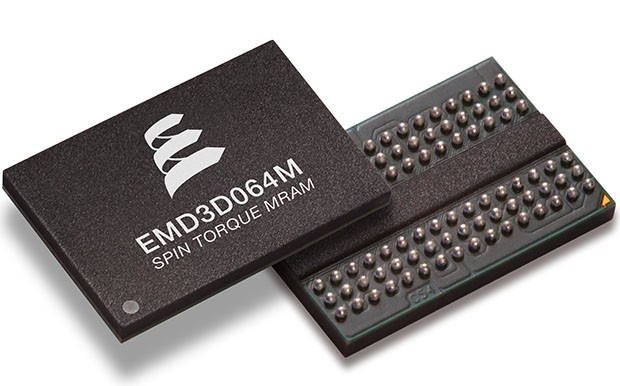Researchers Improve MRAM, Replace STT With Voltage
Researchers at UCLA have developed a variant of MRAM, which they claim can reach much higher densities and consume up to 1000 times less power than current STT-MRAM.
Called MeRAM for magnetoelectric random access memory, the technology replaces the spin-transfer torque feature of MRAM, which uses electric current to move electrons to write data into the memory, with the difference in electrical potential (voltage) to write data into the memory. According to the scientists, this approach "resulted in computer memory that generates much less heat, making it 10 to 1,000 times more energy-efficient." Also, the scientists believe that MeRAM can be more than five-times as dense as STT-MRAM.
The research was published in a paper called "Voltage-Induced Switching of Nanoscale Magnetic Tunnel Junctions" at the 2012 IEEE International Electron Devices Meeting in San Francisco on December 12.
While the researchers said that the technology has "great potential to be used in future memory chips for almost all electronic applications, including smart-phones, tablets, computers and microprocessors, as well as for data storage, like the solid-state disks used in computers and large data centers", there was no information how soon it could become commercially available.
Contact Us for News Tips, Corrections and Feedback
Get Tom's Hardware's best news and in-depth reviews, straight to your inbox.

Wolfgang Gruener is an experienced professional in digital strategy and content, specializing in web strategy, content architecture, user experience, and applying AI in content operations within the insurtech industry. His previous roles include Director, Digital Strategy and Content Experience at American Eagle, Managing Editor at TG Daily, and contributing to publications like Tom's Guide and Tom's Hardware.
-
abbadon_34 We'll see where it stands a year from now with all the other future techs. With a the memory industry complaining of low prices and low demand, and high end overclocked memory not being much of a benefit compared to standard speeds with good latency, I'm not sure we'll see much move to invest in significant tech advances, just the marginal if we're lucky.Reply -
drwho1 "resulted in computer memory that generates much less heat, making it 10 to 1,000 times more energy-efficient."Reply
10 to a 1,000... that's a huge gap that translate to me as a lot of space for inaccurate info.
I like to read more about this when more accurate info is available. -
JOSHSKORN Sumukh_BhagatDidn't understood much.Reply
But Sounds good.Don't worry about it. Seems like we never hear about these "breakthroughs" ever again after they're announced. A similar comment was made on a similar article not too long ago.
But yeah, agree...it sounds cool. -
Duckhunt 10 .. 1000 times? Someone tends to exaggerate.Reply
As usual it is like particle physics. Yes we have so many particles. What are they called? lets just name them after each other. Then we can worry about if they really exist or not.
-
annymmo drwho1"resulted in computer memory that generates much less heat, making it 10 to 1,000 times more energy-efficient."10 to a 1,000... that's a huge gap that translate to me as a lot of space for inaccurate info.I like to read more about this when more accurate info is available.Reply
Nope, that a huge space for difference between maximum power limits and minimum power limits.
This does not say anything whatsoever about whether the info is inaccurate or not.
